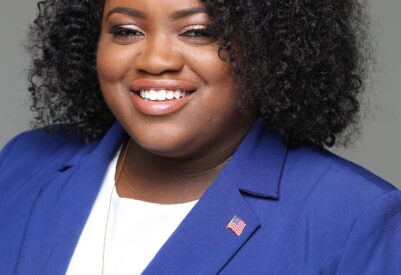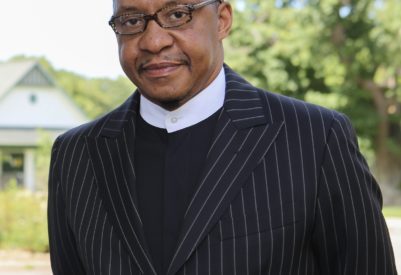
Cover Photo: RCSD Commissioner Natalie Sheppard
SOUTHWEST TRIBUNE
Newly installed Rochester City School District’s Board Member Natalie Sheppard’s victory in November of 2017, is a continuation of her years as a fierce advocate for youth.
To the Board: She brings an honest voice and a social worker background that stems from the Urban League of Rochester as a program coordinator; Monroe County Children’s Detention Center, as an intake worker at the Crisis Nursery; and Monroe BOCES 1, as a paraprofessional and associate.
She also have worked within Hillside Family of Agencies’ Therapeutic Foster Care Division, before accepting her current position as a social worker at Children Awaiting Parents.
Our Conversation
Southwest Tribune: Why School Board?
Commissioner Sheppard:
At Hillside, I was responsible for our foster care kids’ education and social and emotional development. And, finding them stable housing.
Through those experiences, I've learned how to navigate the system. And how to make the right connections and the right relationships with people to ensure the kids on my caseload will get what they need. However, I always felt I can do more as an advocate for youth on a higher level. The Board gives me an opportunity to do just that.
Southwest Tribune: Your profile says, you’re good at identifying problems. What problems have you identified thus far?
Commissioner Sheppard:
The common practices of a social worker are a huge part of my core. Therefore, I’ve identified ‘relationships’ in our district that are broken between the leadership and adults. If, we’re talking about putting our district on a trajectory to success, we must ensure the adults we put in charge are getting along, if we expect to take care of our students, appropriately.
If there’s this constant [Us] versus [Them] mentality, the ‘needed’ work gets bogged down. And personal feelings are injected into the conversation when we’re here to be professional and connect with our students. Hopefully, we can repair that.
Also, I think there’s a disconnect with understanding what our students want. I have a big focus on extracurricular activities that include sports. I was a student athlete, so I understand the importance of giving students something that they want and using that as leverage to say to the student: Now, I need you to come and sit in class, so you can learn what’s needed to get to the next grade. We got to make sure we take care the fun piece as well.
Southwest Tribune: What’s your perspective on the State appointing a distinguished educator to oversee the RCSD
Commissioner Sheppard:
The ‘distinguished educator’ that’s coming is appointed by the State to oversee all the schools in the district. We also have an ‘independent moderator’ to oversee one of our schools that closing and re-opening, which is school #41. We often advocate for the things we need.
What I’ve seen, it’s not always taken as seriously as I think it will be taken if someone was to come-in and give those same recommendations. My issue is, it’s going to be the same recommendations. So, I have some reservation about it. However, I will do my job and accept the person the State appoints.
Hopefully, we can change the culture, if we as a community start to advocate on different levels. We must get out this mindset that the fight stops here, locally.
Southwest Tribune: Why would the State listen to someone outside the community and not those elected to represent the community?
Commissioner Sheppard:
Since I came on board, I’ve learned, ‘relationships’ matters when you’re in politics. And there’s a lot of bureaucracy. So, if a person doesn’t personally like someone or an individual didn’t support something another individual put forth, then there’s animosity there.
When some people get into seats of power, they use it to send a message through their actions that says: I don’t care, if what you want is best for the school or best for the students or community. I don’t like you. So, I’m not going to support it or help you move it forward.
And from my observations, I believe, they may be some animosity in the working relationships, we have with the State. Hopefully, we can repair those relationships and remove any clout from the equation, so we can move forward with the things we need.
Southwest Tribune: How do we get the high percentage of kids up-to-speed, where they’re reading, comprehending and computing at their proper grade level?
Commissioner Sheppard:
I think, the people that matter the most in the classroom are the students and the teachers. So, we’ve been implementing professional development training. Naturally, as each generation replaces its predecessor, how the new generation of kids learn and interact with people is different and embedded with [change].
Therefore, our approach on how we connect with this generation of students, also must change. Technology is a major objective. But, we’re getting away from teaching our black and brown children empowering facts about, who they are from a historical perspective. And that’s critical, when assessing what our children interests are in the classroom.
The connection and relationship piece, I don’t think you can learn through training. This part requires trials and errors and a commitment that shows everyone recognize the sense of urgency we’re in.
On the other end of the pendulum, we need to do a better job of uplifting our teachers as well, because it’s tough in the classroom when they don’t have the sufficient support they need to get the job done.
And for the students, we need to empower them to a point, where they understand everything is not going to always be fun. And come to grips with the reality that they’re in-control, when it comes to what they do in the classroom. We will make sure, we do the rest, if they meet us halfway.
Southwest Tribune: What happen to the ‘new’ Racial Equity, Advocacy and Leadership Team (R.E.A.L.), that’s centered around diversifying its staff to match the diversity seen in the community they serve. And to develop, a culturally responsive curriculum in the classroom that prioritizes African Studies?
Commissioner Sheppard:
The board takes racial equity seriously. From my observation, the R.E.A.L. Team has gotten off to a slow start. But, I believe it’s going to pick up traction. Unfortunately, the leader of the program Deputy Superintendent Bo Wright is transitioning out. Once you transition out the leader of something, it pauses its development.
So right now, there hasn’t been any recommendations from the team. But, I believe in the work and intent of R.E.A.L. And I hope to see something soon. It’s a critical piece and the main piece that’s missing how we move this thing forward effectively.
Southwest Tribune: Special Education?
Commissioner Sheppard:
A lot of the identifying issues in our special education department and the RCSD specifically, has been issues before I was born. I know, Commissioner Melanie Funchess has led the advisory committee to get it up and off the ground. We’re moving into the recommendation phase. It’s not that we don’t know what’s wrong.
I think, it has been a lack of enforcement. And that’s the problem. Some commissioners have served on the Board for multiple terms and unfortunately haven’t been able to connect with leaders in the district that are supposed to enforce, what we need to do.
An example is measures of compliance. If we’re not in compliance, we need to check that immediately. The problem has been enforcement and implementation. But, I’m hopeful that Commissioner Funchess and the committee she’s working with is going to make the necessary improvements.
Southwest Tribune: The Board spends nearly a billion dollars every year and has little to show in terms of positive results?
Commissioner Sheppard:
I voted [No] to this year’s budget. The way I look at it, if you got to feed a family of seven with a certain amount of money and decides to go out and buy one lobster tail. In result, most of the members of that family is going to bed hungry.
Where, we’re spending the money, we’re not getting the best bang for our bucks. I also voted [No] because, if we have a budget, we should be able to explain to our community, where the money is going.
And the following year, the community should see improvement in the area the money was dispensed. If we’re spending all this money, we should be able to produce more. A lot of the money is spent on salaries. So, we need to figure that out, so students can get what they need.
Southwest Tribune: Predictions after your first term?
Commissioner Sheppard:
An 80% graduation rate. I don’t see any reason why it can’t be accomplished. I don’t mean, just walking kids across the stage, because that’s not what I’m about.
The graduates ‘must’ be career or college ready. Whatever percentage we’re walking kids across the stage that same percentage must be career or college ready, because right now the gap is wide. We can't highlight a 51 percent graduation rate, but only 4 percent are career or college ready.





